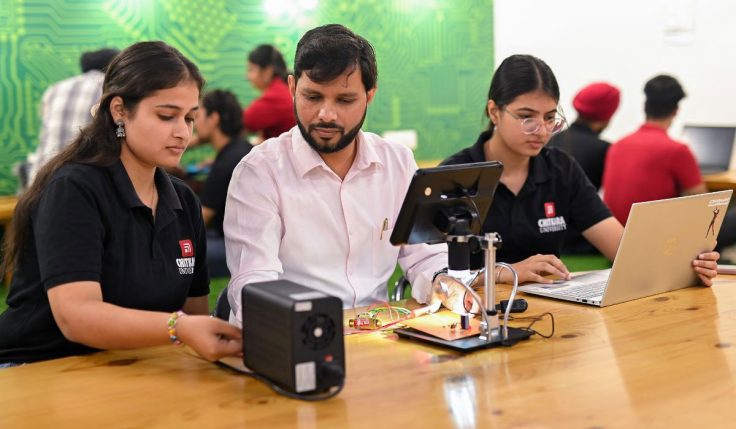Nowadays, it seems like everyone is online. The Internet is a popular resource for numerous sorts of information and not just for inter-user communication (such as email and social media). Furthermore, it is a practical way to make purchases and pay expenses.
Every web program has a user-interaction component. The welcome page, menu, site map, and other elements that make navigation and utility easier are displayed when you first visit a website. All of those things are referred to as “front end” together. The user interface, the area of the website or app created specifically for the user’s experience, is a component of the front end.
Keeping in mind the growing demand for developers, Chitkara University offers B.Tech Computer Science wherein students are taught how to ace their front-end development skills.
Also Read: Future Scope Of Full Stack Developers In India
About Front-End Developers
A front-end developer usually referred to as a front-end web developer is a specialist in charge of creating the interface. For them to use the program in question, the users need this interface. A web designer is a specialist who develops the look and layout of websites. Additionally, the front-end developer uses coding languages like CSS, HTML, and JavaScript to ensure that the design functions online.
Thus, top engineering colleges in India focus on honing the aforementioned skills amongst the students who have enrolled in specialised B.Tech courses.
Major Roles and Responsibilities
Some of the best universities for computer science engineering such as in India focus on preparing the students for the following roles and responsibilities as front-end developers:
- Choose a web page’s structure and design.
- Create features that will improve the user experience
- Achieve harmony between practical and aesthetically pleasing design.
- Make sure the website is mobile-friendly.
- Create reusable code for upcoming uses.
- Ensure that websites are scaled and optimised for performance.
- Use a variety of markup languages to create web pages.
- Maintain the brand identity across the whole design.
- Full Stack Development
Also Read: Career In Game Development: A Complete Guide
Top Skills Needed to become a Front-End Developer
A front-end developer has to have a well-stocked personal toolkit because they are the rock star of website/app development. Therefore, a front-end developer must have the following skills:
- An education in computer science or a related field
- Possess code expertise in languages like HTML, CSS, JavaScript, and jQuery
- Recognize server-side CSS.
- Possess knowledge of graphic design software (e.g., Adobe Illustrator)
- Recognize the fundamentals of SEO.
- Possess exceptional problem-solving abilities
- Be able to communicate effectively with co-workers, superiors, and clients.
- Possess effective interpersonal skills
Also Read: Is Computer Engineering A Good Career?
How to Become a Front-End Developer
Learn coding languages: You must understand coding languages such as JAVA, CSS, and HTML since they are fundamental building blocks for creating websites and mobile applications. Fortunately, it’s not a really challenging task. There are several online resources that might aid in your quest to increase your knowledge of coding languages. Learn about the jQuery and JavaScript Frameworks for additional credit.
Read about recent developments: This necessitates reading front end development-related articles and books. You can better grasp the various coding languages if you have a basic idea of how a website functions. Watch some YouTube videos and interact with the esteemed faculty at Chitkara University about your doubts to complete your educational experience.
Practice and Revision: Build little portions of a user interface utilising your newly acquired expertise to start small, then gradually expand. Don’t worry if you do wind up making blunders. Sometimes making mistakes teaches us more than doing perfectly.
Look for internships: A junior front end developer or intern will often work under more experienced individuals because this is sometimes the greatest way to pick up new abilities. Of course, the salary is lower, but there are fewer requirements. Additionally, you will be learning from those who have more experience, which is always advantageous. Pursuing B.Tech in Computer Science at Chitkara University will open wide avenues of opportunities to complete internships in leading tech companies.
Also Read: Most In-Demand Computer Science Engineering Jobs In The Next Decade
Growth of Front-End Development
Front-end developers make creative use of platforms to design better, more appealing user interfaces for everyone who visits websites and applications. Additionally, they seek for methods to sustain and enhance the user experience, particularly when technology changes and consumers have varying wants and needs.
Front end development abilities are in high demand on the job market as businesses focus more of their attention online. The answer is straightforward: such talents are essential for a variety of online-related employment, such as web design, web integration, and app development. Businesses in practically every sector, from healthcare to financial services, look for excellent front end developers that can improve their user experience because customers want to use websites and applications that are quick, responsive, and simple to use.
Conclusion
The future of computer science engineering with specialization in front-end development is open to professionals who are informed about current technology and creative enough to assist build this field and its applications. In conclusion, Chitkara University recognises the urgent need to develop future-ready computer specialists and strives to support the field by providing research-driven and industry-specific B.Tech Computer Science programs with concentrated specialisations.






